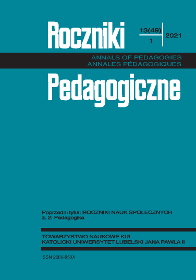Self-forgiveness as an Educational Objective
Main Article Content
Abstract
Forgiving oneself is considered to be one of the most controversial decisions. Not only because this is when we release ourselves from the consequences of our morally wrong choices, but also because it seems to suggest that we give ourselves an implicit consent to perform similar acts in the future. Nevertheless, psychological literature points to positive aspects of self-forgiveness. This study focuses on the moral value of self-forgiveness, and consequently, the legitimacy of including it as one of the objectives in the education process. Firstly, the decision to forgive oneself is compared to acts of self-acquittal, self-justification, and self-pardon. Secondly, an analysis ensues of the act to which the right of self-forgiveness can be applied. Finally, the process of self-forgiveness is discussed along with the conditions it requires.
Article Details
References
Cornish, M.A., Wade, N.G. (2015). A Therapeutic Model of Self-Forgiveness with Intervention Strategies for Counselors. Journal of Counseling & Development, 93(1), 96-104.
Dillon, R.S. (2001). Self-Forgiveness and Self-Respect. Ethics, 112(1), 53-83.
Enright, R.D., the Human Development Study Group (1996). Counseling Within the Forgiveness Triad: On Forgiving, Receiving Forgiveness, and Self-Forgiveness. Counseling and Values, 40(2), 107-126.
Fiala, A. (2010). Justice, Forgiveness, and Care: A Pragmatic Balance. Ethical Perspectives, 17(4), 580-602.
Gamlund, E. (2014). Ethical Aspects of Self-Forgiveness. SATS, Northern European Journal of Philosophy, 15(2), 237-256.
Griswold, Ch.L. (2014). Forgiveness. A philosophical exploration. New York: Cambridge University Press.
Grochala, S. (2016). Przebaczenie sobie w kontekście rozwoju osobistego w wieku senioralnym. Paedagogia Christiana, 38, 203-220.
Hall, J.H., Fincham, F.D. (2005). Self–Forgiveness: The Stepchild of Forgiveness Research. Journal of Social and Clinical Psychology, 24(5), 621-637.
Holmgren, M.R. (1993). Forgiveness and The Intrinsic Value of Persons. American Philosophical Quarterly, 30(4), 341-352.
Holmgren, M.R. (1998). Self-Forgiveness and Responsible Moral Agency. The Journal of Value Inquiry, 32, 75-91.
Horowski, J. (2018). What conditions education for forgiveness in terms of the neo-Thomistic philosophy of education. Journal of Religious Education, 66(1), 23-36.
Horowski, J. (2019). Education for Forgiveness in the Context of Developing Prudence. Ethics and Education, 14(3), 316-332.
Milam, P.E. (2017). How Is Self-forgiveness Possible? Pacific Philosophical Quarterly, 98(1), 49-69.
Murphy, J. (1982). Forgiveness and resentment. Midwest Studies in Philosophy, 7(1), 503-516.
Osei-Tutu, A., Cowden, R.G., Kwakye-Nuako, Ch.O., Gadze, J., Oppong, S., Worthington, E.L. (2020). Self-Forgiveness Among Incarcerated Individuals in Ghana: Relations With Shame- and Guilt-Proneness. International Journal of Offender Therapy and Comparative Criminology, 1-13.
Szablowinski, Z. (2012). Self-Forgiveness and Forgiveness. The Heythrop Journal, 53(4), 678-689.
Szostek, A. (2016). Czy możliwe jest przebaczenie w relacjach międzynarodowych? Paedagogia Christiana, 37, 121-137.
Wach, T.J. (2016). Krzywda i przebaczenie w resocjalizacji i innych działaniach pomocowych. Paedagogia Christiana, 38, 221-241.
Wohl, M.J.A., Thompson, A. (2011). A dark side to self-forgiveness: Forgiving the self and its association with chronic unhealthy behaviour. British Journal of Social Psychology, 50(2), 354-364.
Wojtyła, K. (1994). Osoba i czyn. W: tenże, Osoba i czyn oraz inne studia antropologiczne (s. 43-335). Lublin: Towarzystwo Naukowe KUL.

